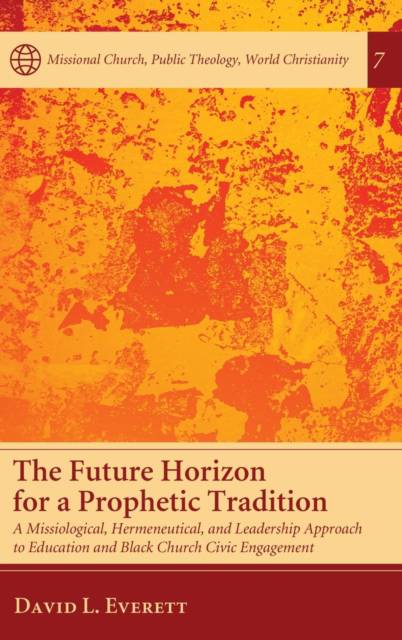
- Retrait gratuit dans votre magasin Club
- 7.000.000 titres dans notre catalogue
- Payer en toute sécurité
- Toujours un magasin près de chez vous
- Retrait gratuit dans votre magasin Club
- 7.000.000 titres dans notre catalogue
- Payer en toute sécurité
- Toujours un magasin près de chez vous
Description
In this book David Everett examines how Church has changed throughout a modern/postmodern context. Everett explores how social gospel dimensions and prophetic radicalism have diminished in a way that it might reestablish itself as a pillar in the community through a retrieval of its prophetic voice and social gospel roots so that it to might be missional-minded and civically-engage. Everett anticipates that this perspective will assist the Black Church in the reclamation of its heritage by confirming its purpose and affirming its position within the missional context that God has placed it. ""David Everett opens a brand new chapter in North American missional ecclesiology by drinking deeply from the riches and challenges of Black Church spirituality, leadership, and emancipatory public theologies. He unleashes innovative possibilities, grounded in social scientific research, for pastoral leadership and the Black Church's new Spirit-led missional moment in history. No longer can the missional church conversation excuse itself for neglecting the prophetic and participatory wisdom of African American Christianity."" --Gary M. Simpson, The Northwestern Lutheran Theological Seminary Chair in Theology, Professor of Systematic Theology, Luther Seminary ""The missional ecclesiology conversation has long been in need of an historically grounded, theologically astute engagement with the history of the Black Church in the states. David Everett offers here an imaginative and innovative interweaving of text-driven and active appreciative inquiry into the contexts and commitments of such churches. He has constructed a powerful argument for how the Black Church's historic and unique commitment to public action needs to shape our understanding of missional ecclesiology."" --Mary E. Hess, PhD, Patrick and Barbara Keenan Visiting Chair in Religious Education, University of St. Michael's College, the University of Toronto David L. Everett is the Diversity and Inclusion Consultant for the Department of Human Services/State of Minnesota as well as adjunct professor for the Minnesota State Colleges and Universities system.
Spécifications
Parties prenantes
- Auteur(s) :
- Editeur:
Contenu
- Nombre de pages :
- 130
- Langue:
- Anglais
- Collection :
- Tome:
- n° 7
Caractéristiques
- EAN:
- 9781498278645
- Date de parution :
- 20-03-17
- Format:
- Livre relié
- Format numérique:
- Genaaid
- Dimensions :
- 152 mm x 229 mm
- Poids :
- 349 g







